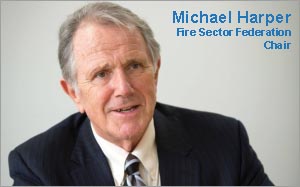Fire Sector Federation Chairman Acknowledges Frustration at Progress to Prevent Future Fires like Grenfell Tower
Largest European Construction Project Protected with Cygnus

- Fire Sector Federation Chairman Michael Harper recognises second Grenfell Tower Fire anniversary calling for “action”
- A “refresh and renewal of efforts” is needed he says to stop another Grenfell Tower fire happening again.
- Accepting a lot of good preparatory work has been done and is underway within industry, public services and government he demands more speed and practical actions to increase fire safety
Introducing a lively debate on Building a Safer Future at the Firex International event held on 18th of June 2019 in the ExCel centre in London Michael Harper, who became the Federation’s Chairman last year, welcomed the progress made whilst expressing the frustration professionals and residents have concerning the lack of positive actions taken to stop another catastrophic fire.
He told the audience of well over 100 that the Fire Sector Federation (FSF) along with many others inside and outside government had been trying to address the myriad of issues in a building system that so clearly failed while also trying to identify the products that can and cannot be used in circumstances like high rise or high risk buildings. Observing “this has not been an easy or indeed fast task, and in fact it has at times been frustrating and painfully slow”, he added the caveat that “it does of course have to be thorough and meticulous”.
Part recalling Churchill’s ‘this may be the end of the beginning’ Michael Harper also emphasised the clear wish to see the public inquiry move quickly into its investigative second phase and for the government’s current building safety consultation to bring into fruition the “bedrock change” of a better building control system. One that “chased down the whole culture and competency of a construction industry that had somehow become complacent if not, in some cases, positively indifferent about fire safety”.
Outlining that the Federation had joined with many others to implement 100% of Dame Judith Hackitt’s final report to stop cherry picking or conversely avoid the “too difficult” issues and very recently had also backed the Inside Building campaign to have public finance allocated to assist private tenants remove the cladding from their buildings, Michael pointed out this was no sudden call to action.
Indeed for a number of years FSF members had, he said, argued for a review of building regulations; pressed the case for defining competency; suggested strongly that third party installers offer assured quality; promoted sprinklers and alarms to protect the vulnerable; and argued for better building protection. And this was not because of vested commercial interest but because all FSF members share a common commitment to improve fire safety in the UK.
Organisations like FSF often had a difficult task in bringing the diverse views of their members together but he closed his comments by saying he was pleased that on many issues that common commitment had allowed FSF to agree “a common denominator” position in a number of fire safety concerns.
Immediately after the introduction to Building a Safer Future a panel of FSF lead officers addressed issues relating to fire strategy, competency, active and passive fire protection. The concern that two years after Grenfell little change had actually happened in regulation, products and practices was raised and debated. The underlying belief that few people really understood fire from a risk perspective, knew how to recognise companies and people who were competent and third party assured, and were unprepared to support a socially responsible industry simply because it cost more to have that quality, were all explored by the panel and their questioners.


